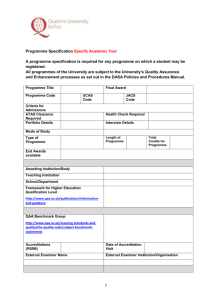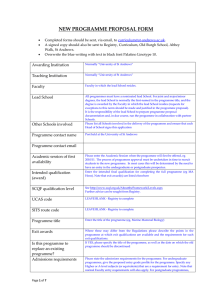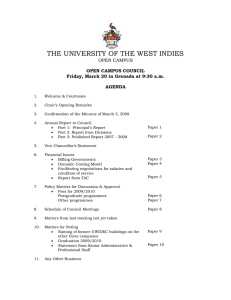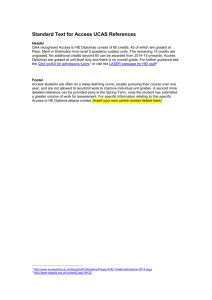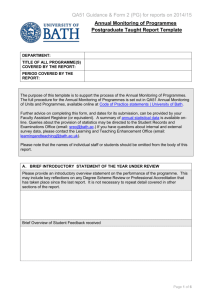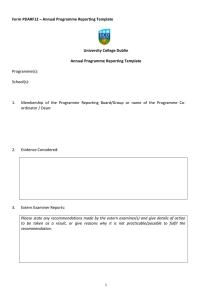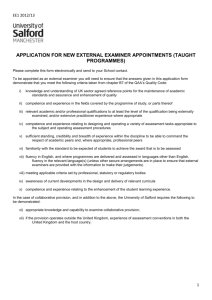NEW PROGRAMME PROPOSAL FORM
advertisement
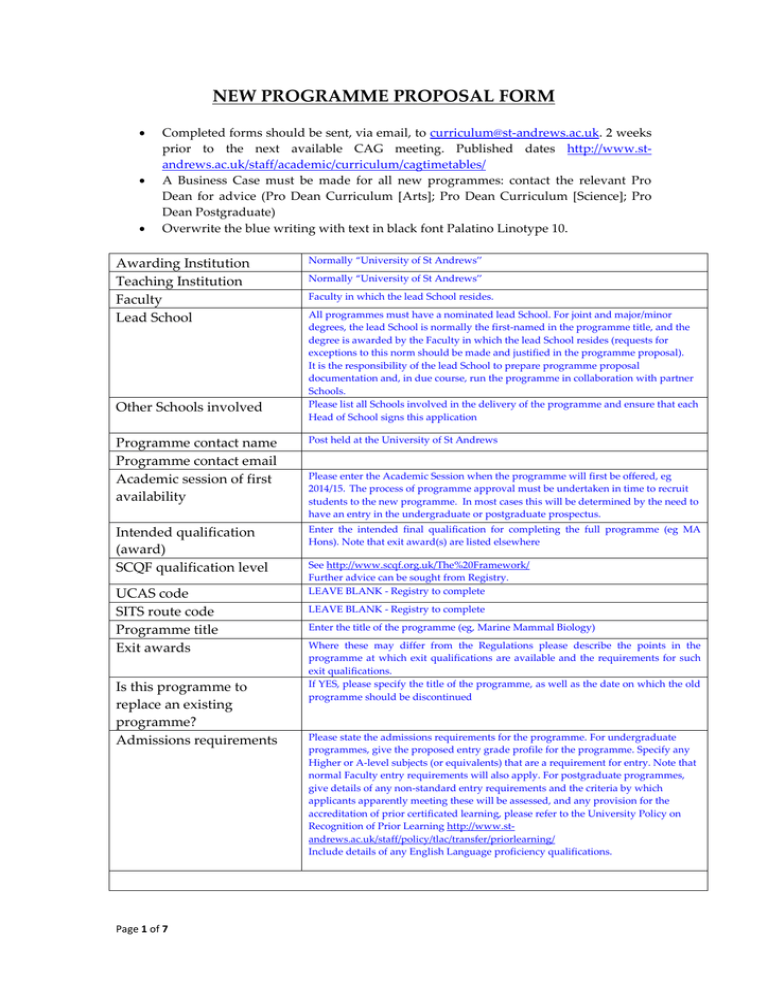
NEW PROGRAMME PROPOSAL FORM Completed forms should be sent, via email, to curriculum@st-andrews.ac.uk. 2 weeks prior to the next available CAG meeting. Published dates http://www.standrews.ac.uk/staff/academic/curriculum/cagtimetables/ A Business Case must be made for all new programmes: contact the relevant Pro Dean for advice (Pro Dean Curriculum [Arts]; Pro Dean Curriculum [Science]; Pro Dean Postgraduate) Overwrite the blue writing with text in black font Palatino Linotype 10. Awarding Institution Teaching Institution Faculty Lead School Other Schools involved Normally “University of St Andrews” Normally “University of St Andrews” Faculty in which the lead School resides. All programmes must have a nominated lead School. For joint and major/minor degrees, the lead School is normally the first-named in the programme title, and the degree is awarded by the Faculty in which the lead School resides (requests for exceptions to this norm should be made and justified in the programme proposal). It is the responsibility of the lead School to prepare programme proposal documentation and, in due course, run the programme in collaboration with partner Schools. Please list all Schools involved in the delivery of the programme and ensure that each Head of School signs this application Programme contact name Programme contact email Academic session of first availability Post held at the University of St Andrews Intended qualification (award) SCQF qualification level Enter the intended final qualification for completing the full programme (eg MA Hons). Note that exit award(s) are listed elsewhere UCAS code SITS route code Programme title Exit awards Is this programme to replace an existing programme? Admissions requirements Page 1 of 7 Please enter the Academic Session when the programme will first be offered, eg 2014/15. The process of programme approval must be undertaken in time to recruit students to the new programme. In most cases this will be determined by the need to have an entry in the undergraduate or postgraduate prospectus. See http://www.scqf.org.uk/The%20Framework/ Further advice can be sought from Registry. LEAVE BLANK - Registry to complete LEAVE BLANK - Registry to complete Enter the title of the programme (eg, Marine Mammal Biology) Where these may differ from the Regulations please describe the points in the programme at which exit qualifications are available and the requirements for such exit qualifications. If YES, please specify the title of the programme, as well as the date on which the old programme should be discontinued Please state the admissions requirements for the programme. For undergraduate programmes, give the proposed entry grade profile for the programme. Specify any Higher or A-level subjects (or equivalents) that are a requirement for entry. Note that normal Faculty entry requirements will also apply. For postgraduate programmes, give details of any non-standard entry requirements and the criteria by which applicants apparently meeting these will be assessed, and any provision for the accreditation of prior certificated learning, please refer to the University Policy on Recognition of Prior Learning http://www.standrews.ac.uk/staff/policy/tlac/transfer/priorlearning/ Include details of any English Language proficiency qualifications. Academic Rationale Why is this programme being proposed? Briefly explain the reason why the programme is proposed. What are the planned benefits? Briefly explain the benefits for the University, School and student body. Who are the target students? What is the estimate of enrolment? Admissions should be able to offer advice in completion of this section. Schools should supply evidence of student demand for this programme and give details of any specific induction or support be required eg, for cohorts of overseas students. Programme structure Level of Study Type of programme Mode of Delivery Length of programme Credits required in each year Total credits required for completion of programme Programme structure Postgraduate / Undergraduate Single / Joint (and) / Major/Minor (with) Full-time / Part-time with attendance requirement / Evening / Distance or e-Learning Supply a breakdown of the number of credits to be gained in each year. Total number of credits needed to gain the final qualification. Core module: list module titles and level which must be taken and passed by all students on this programme. Insert rows as required. Optional modules: list of module titles and level one or more of which must be taken and passed by all students on this programme. Insert rows as required. Year Core modules Optional modules Programme descriptor (100 words) Describe the key topics and features of the programme. Supplementary programme information Provide any supplementary information Progression rules It will be assumed that all programmes will comply with Faculty rules on progression for undergraduate and postgraduate taught programmes. Details should be provided about any aspects of programme progression which do not comply with standard procedures. Any aspects of the programme which encourage progression should also be provided (eg, if the programme overlaps with others to facilitate transfers of degree programme, Access programmes, Conversion programmes, etc). The structure for the programme should be provided, broken down by year and semester and each semester should normally comprise 60 credits, and one full-time year should normally constitute 120 credits. Page 2 of 7 Programme requirement – ie, entry for Course Catalogue Please see Undergraduate / Postgraduate Course Catalogues for the style required. Teaching arrangements Does the programme take account of student equality and diversity issues? Does the programme have a compulsory year abroad? Provide any supplementary information as appropriate. Contact for advice: Equality and Diversity Officer, Human Resources. Does the programme have a compulsory period of work experience or placement? Does the programme involve fieldwork or time at facilities outside St Andrews? Will this be taught in partnership with another institution? Percentage of programme taught at partner institution Will this be provided with the support of a collaborating organisation? If YES, you must provide evidence of support from hosts of work placements Details of support to be given to students before and during the placement should be provided. If YES, describe the nature of the year abroad, provide information on risk assessments will be conducted and specify the relevant programme year. Details of support to be given to students before and during the year abroad should be provided. If Yes, you will need to provide an approved risk assessment and inform the University Insurance Officer to ensure insurance cover prior to conducting any fieldwork. Details of support to be given to students before and during the fieldwork should be provided. If YES, give name(s) of partner(s), You must provide evidence of support from the partner institution. If the programme is to be offered in partnership, please supply the name(s) of the partner institution(s). If YES, give name(s) of organisation(s) and background. You must provide evidence of support from the organisation. Programme specifications Relevant QAA Benchmarking Statements Benchmarking subject statements may be found at the following QAA link: http://www.qaa.ac.uk/assuringstandardsandquality/subject-guidance/pages/subjectbenchmark-statements.aspx Relevant QAA Benchmarking Statements for Honours Degrees Benchmarking subject statements may be found at the following QAA link: http://www.qaa.ac.uk/AssuringStandardsAndQuality/subjectguidance/Pages/Honours-degree-benchmark-statements.aspx Page 3 of 7 Accreditation This section should also describe any professional / statutory body accreditation or recognition by external bodies. Where applicable, this should indicate the level of accreditation/recognition and the period of validity of accreditation/recognition. Educational aims of programme Programme Aims may be kept to a series of summary bullet points. The aims of the programme will appear in the Programme Specifications for the course. They are therefore in the public domain and may be the object of scrutiny by external bodies. They should therefore be written with care. Examples of Programme Aims given by the Quality Assurance Agency can be viewed at: http://www.qaa.ac.uk/Publications/InformationAndGuidance/Documents/guidelines 06.pdf Distinctive programme features Explain any special features of the programme which distinguish it from similar degrees offered in other institutions or from other degrees offered in St Andrews. Examples here might include the opportunity for a work placement, novel forms of learning or assessment, the opportunity to work in detail on a specific subject, etc. Programme outcomes / Graduate attributes In the course of this programme students will develop programme-specific skills. On completing the programme students should be able to demonstrate the graduate attributes outlined below. https://www.st-andrews.ac.uk/progspecs/ Intellectual skill and attributes Examples : Ability to construct a coherent argument or debate Ability to create a hypothesis and appreciation of how hypotheses relate to broader theories Ability to evaluate hypotheses, theories, methods and evidence within their proper contexts Ability to reason from the particular to the general Ability to solve complex problems by critical understanding, analysis and synthesis Capacity for close textual analysis and comparative analysis Capacity for close analysis of visual material Creativity and originality Curiosity and an enquiring mind Deductive reasoning Engagement with both primary and secondary material and an appreciation of the differences between them Independence of thought Qualitative methods of analysis Logical processing of information Sophisticated use of a range of resources appropriate to the task at hand Professional / subjectspecific / practical skills Examples : Clarity of expression, including correct spelling, grammar and punctuation Direct engagement with current research and developments in the subject Discipline specific technical abilities Transferable skills Examples: Listening Oral presentations Rapport building Written material Active engagement and initiative in team working Collective responsibility Page 4 of 7 Teaching, Learning and Assessment strategies The skills and graduate attributes listed above will be accomplished through delivery of the following teaching, learning and assessment strategies appropriate to the programme aims. Teaching and Learning Students will engage with independent and group study in a supportive framework of teaching and learning. The strategy is to use methods of teaching and assessment that will facilitate learning appropriate to the aims of joint degree programmes. The following methods will be employed where appropriate to the level of study and the particular content of each module in the programme Examples : Lectures One-to-one discussion Project work Seminars Small group discussion tutorials Tutorials Workshops Period of residence in France Material submitted for assessment Assessment can be a blend of diagnostic work to determine student needs, formative work submitted for assessment and feedback (but not necessarily for academic credit) or summative work submitted for academic credit. Examples : Aural comprehension AV media presentations Commentaries Dictation Discourse analysis Class tests Essays, dissertations (short and long) Oral presentations End of semester examinations Programme funding Subject codes (JACS3 codes) Subject percentages Programme cost centres and proportion Is this a closed programme? LEAVE BLANK – Registry to be completed Source of funding (if not Scottish Funding Council) Please detail the source of funding for the programme, ie, how will most students pay for this programme? Fee requirements Please consult the Executive Officer to the Senate and define the fee for the programme if not standard. Page 5 of 7 LEAVE BLANK - To be completed by Registry LEAVE BLANK - To be completed by Registry Is the programme closed in anyway, ie, is enrolment limited to defined groups such as employees of a specific company? Funding allocation Calculation of resource allocation is based on a formula of (actual student enrolment х %FTE allocation specified for each teaching unit). Please supply a teaching load breakdown to ensure eventual resource allocation is fair. Add rows as required. School(s) / Department(s) involved % share of FTE Staff and resource requirements Academic staff requirements Outline who will teach/manage the programme over and above those staff required for the contributing modules. Highlight any new staff appointments that will be required Other staff requirements Provide an indication of the other staff resources required including technical, administrative and secretarial staff. Staff development needs If the introduction of the programme requires staff training or development in new teaching/learning techniques, or in the management of new equipment or facilities, details should be provided and how they will be addressed Library resources Outline the nature of library resources required, and the budget allocation for these. Teaching accommodation Outline the broad nature of teaching accommodation required, including lecture capacity, small group teaching space and laboratory space. IT resources Outline the nature of IT resources required, and how they will be provided. Outline any proposed use of Virtual Learning Environment (VLE) and on-line assessment. Include any specialist software required; any specialist hardware required, ie, hardware not available in standard IT classrooms; any planned use of central IT classrooms for teaching sessions. Administration Head of School authorisation Please provide comment on the provision of resources within your School for this programme . External Examiner reports Business case approval CAG decision : To reject CAG decision: To defer CAG decision : To approve Page 6 of 7 All new programme proposals must be submitted with evidence of External Examiner approval. In the case of joint programmes, a report should be supplied from the External Examiner for each School. Proposals will not be considered without External Examiner approval and Schools are asked to note that External Examiner reports should be attached to the proposal, not incorporated into the body of the form. For new programmes, Heads of Schools are now required to present a Business case. Full details on submission and approval of the Business case are listed on a separate document (seek advice from relevant Pro Dean). Provide dates Provide dates Provide dates Justification of CAG decision From minutes Academic Council approval date Provide date Page 7 of 7
